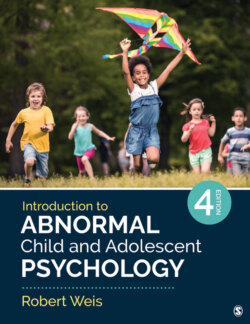Читать книгу Introduction to Abnormal Child and Adolescent Psychology - Robert Weis - Страница 188
На сайте Литреса книга снята с продажи.
Critical Thinking Exercises
Оглавление1 Imagine that you are a psychologist who wants to assess an 8-year-old boy for ADHD. From whom might you gather information about the boy’s behavior? What methods might you use to assess his functioning?
2 Matias is a 9-year-old boy who immigrated to the United States with his mother and two younger siblings from Colombia. Matias’s school psychologist is concerned that Matias might have ADHD. She shared her concerns with Matias’s mother, but his mother said that she was not interested in treatment for her son. How might the school psychologist conduct a cultural formulation interview with Matias’s mother to understand her concerns about treatment?
3 Can a psychological test be reliable but not valid? Can a test be valid but not reliable?
4 Maddy is a 14-year-old girl who is experiencing depression following the death of her father. She has lost interest in many activities she formerly enjoyed, has low energy and sleeps a lot of the time, and acts grumpy and irritable toward others. She also has largely given up on school and has a negative attitude toward her teachers. How might her counselor use (1) behavior therapy, (2) cognitive therapy, and (3) interpersonal therapy to help Maddy?
5 Mr. Fox’s teenage daughter has an anxiety disorder. Her pediatrician recommended that she see a therapist. Mr. Fox was disappointed, saying, “I don’t believe in therapy. Anxiety is caused by neurochemistry—no amount of talk therapy will help.” Evaluate Mr. Fox’s claim. What is the evidence that psychotherapy for adolescents is efficacious? Effective?
